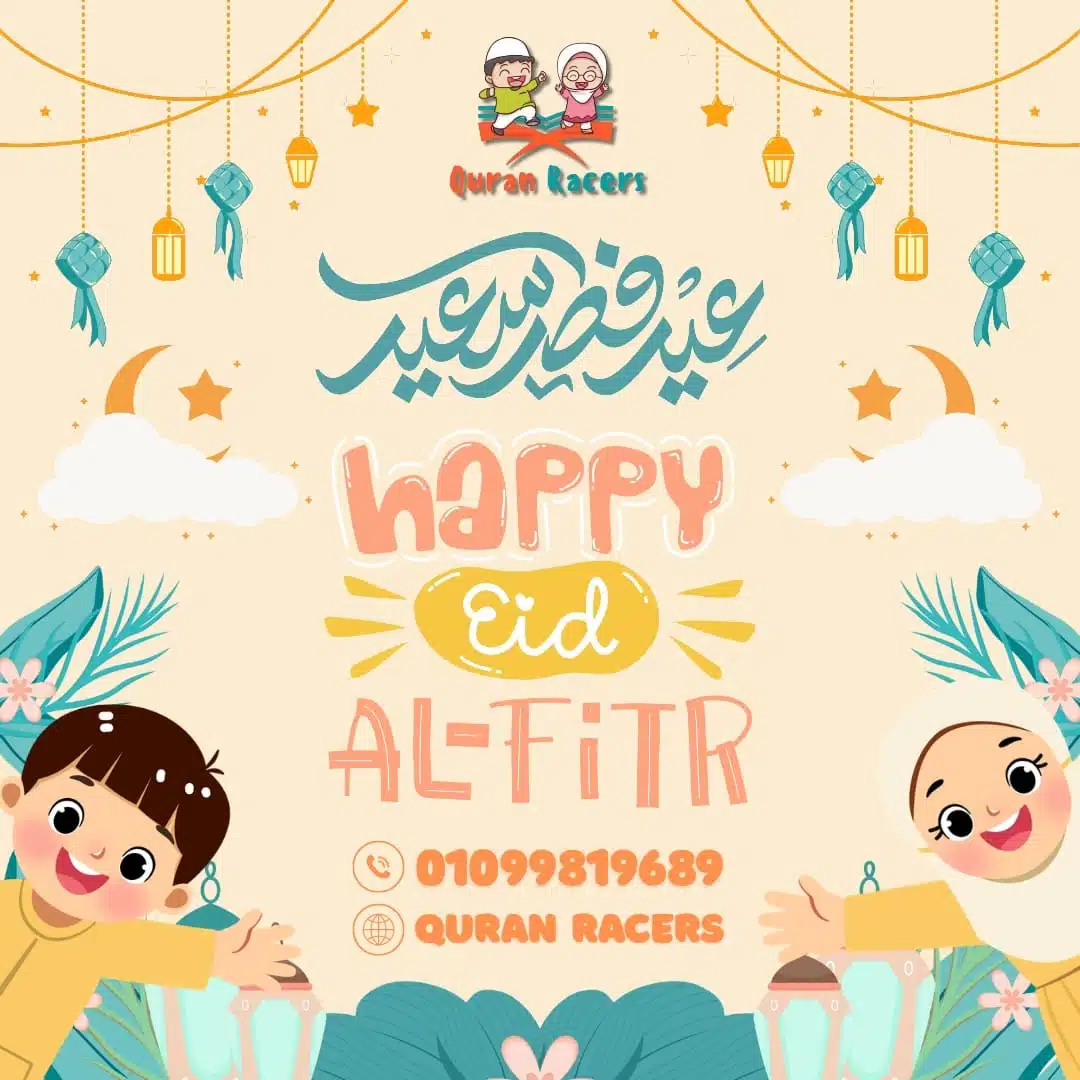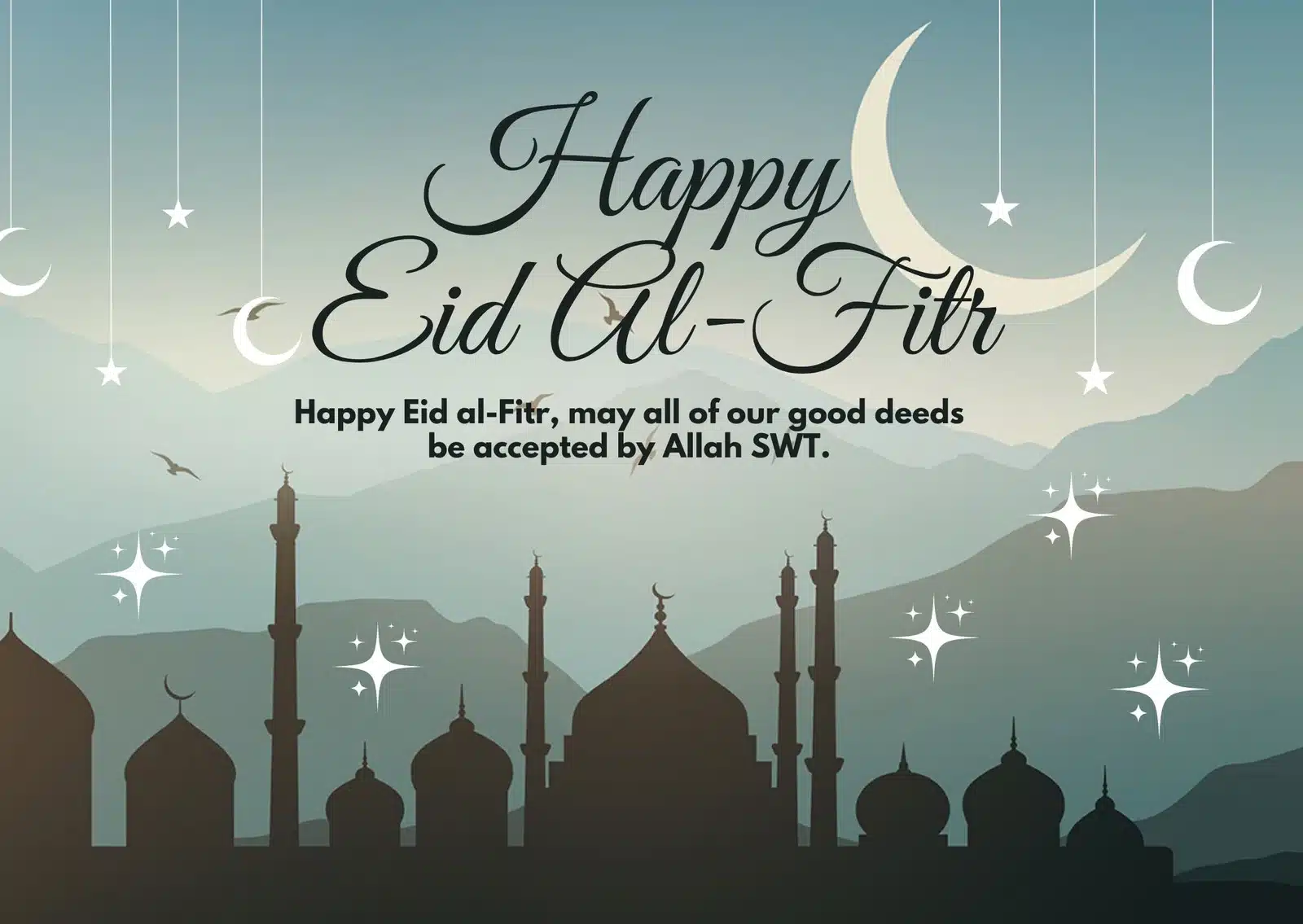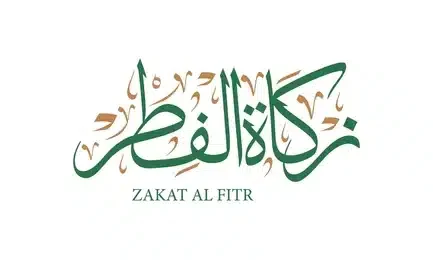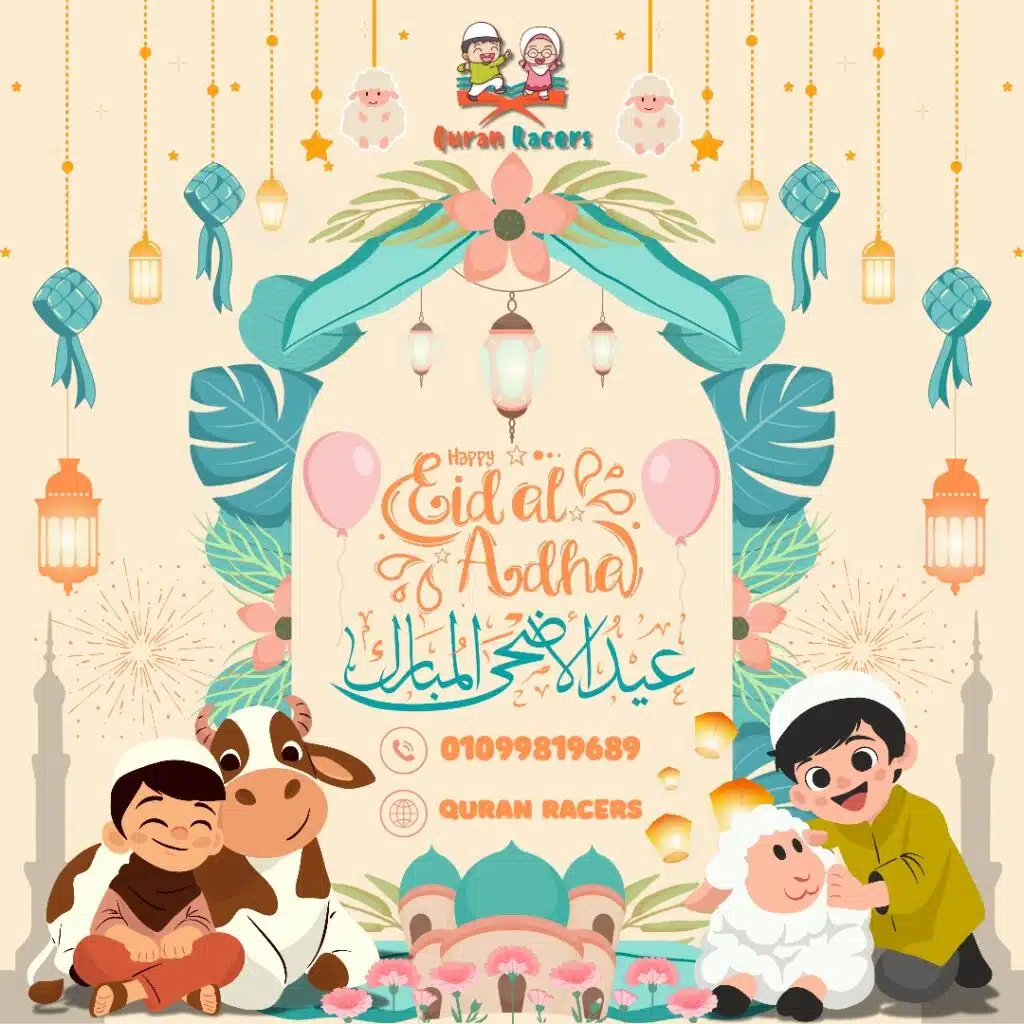The Joy of Eid al-Fitr🎀
Eid al-Fitr is more than just a festival — it is the beautiful culmination of one of the greatest acts of worship in Islam: fasting during the holy month of Ramadan. It is a day filled with gratitude, joy, and spiritual reflection, marking the end of a month dedicated to self-discipline, prayer, and deep connection with the Qur’an.
The word “Eid ” means celebration or feast, while “Fitr ” refers to breaking the fast. Together, Eid al-Fitr symbolizes not only the physical act of eating after a month of abstinence but also the spiritual rebirth that comes from sincere devotion and obedience to Allah (SWT).
As Muslims around the world rise early on this blessed morning, dressed in their finest clothes, hearts filled with gratitude and joy, they are reminded of the mercy and generosity of Allah (SWT). This Eid is more than feasting or exchanging gifts — it is a moment of reflection, community, and deepening one’s connection with the Qur’an.
At QuranRacers , we believe that Eid al-Fitr serves as a powerful reminder of how every act of worship, especially fasting, leads us closer to the Book of Allah, urging us to race toward His pleasure and the treasures of His words.
What is Eid al-Fitr? Understanding Its Meaning and Significance 🪞
Eid al-Fitr marks the joyful conclusion of the holy month of Ramadan — a time when Muslims around the world fast from dawn to sunset, striving to grow closer to Allah (SWT) through worship, self-discipline, and reflection.
It is not just a celebration; it is a reward for an entire month of devotion, patience, and connection with the Qur’an. In fact, Eid al-Fitr serves as a reminder of the mercy and blessings of Allah, who has made fasting obligatory and then granted us a day of joy in return.
The Literal and Religious Meaning of Eid al-Fitr !
In Arabic, “Eid” comes from the root word “عود” (‘awd), which means “to return.” This reflects the idea that Eid is a recurring occasion of happiness and renewal. Eid al-Fitr specifically refers to the return to normal life after the restrictions and spiritual intensity of Ramadan. It’s a day where Muslims are encouraged to eat before heading to prayer — a symbolic act that breaks the habit of fasting and celebrates the completion of a blessed month.
Why Is Eid al-Fitr Celebrated Right After Ramadan?
Eid al-Fitr follows Ramadan because it is a divine gift from Allah (SWT) to His servants for successfully completing the month of fasting. It’s a day of gratitude, joy, and thankfulness for being given the strength to fulfill one of the five pillars of Islam. It also acts as a moment of social unity, where the rich share with the poor through Zakat al-Fitr, ensuring that everyone can celebrate with dignity.
This connection between fasting and Eid highlights the balance in Islam between hardship and ease, discipline and reward, effort and celebration — values that resonate deeply with the mission of QuranRacers: to make learning and memorizing the Qur’an a joyful and rewarding experience.
Eid al-Fitr in the Life of the Prophet Muhammad (PBUH)
The Prophet Muhammad (PBUH) used to celebrate Eid al-Fitr with great enthusiasm. He would wake up early, eat dates before heading to the Eid prayer (preferably an odd number), and walk to the prayer location instead of riding. He also encouraged giving Sadaqat al-Fitr before the prayer and wearing one’s best clothes on this blessed day.
These Sunnahs teach us that Eid is not only about celebration but also about humility, gratitude, and community service — values we strive to instill at QuranRacers through our interactive Quran programs and Eid-themed challenges.
The Historical Roots of Eid al-Fitr in Islamic Tradition
The origins of Eid al-Fitr trace back to the time of the Prophet Muhammad (PBUH), who established it as a day of joy and gratitude following the completion of Ramadan. Unlike pre-Islamic festivals that often involved idolatry or excess, Eid al-Fitr was introduced as a pure, wholesome celebration rooted in faith and community.
Historically, Eid prayers were held in open spaces — fields or large courtyards — symbolizing inclusivity and accessibility for all members of society. Women, men, and children would gather together, strengthening the bonds of brotherhood and sisterhood among Muslims.
How Did the Companions Celebrate Eid al-Fitr?
The companions of the Prophet (PBUH) embraced Eid al-Fitr with both reverence and joy. They would clean themselves, wear their finest clothes, and give charity before heading to prayer. Some narrations mention that they would recite Takbir loudly on the way to the prayer ground, filling the air with praise and glorification of Allah.
This spirit of celebration and remembrance is something we encourage at QuranRacers through our daily reminders and Eid-focused activities that help families stay connected with the Qur’an even during festive times.
Eid al-Fitr Through the Generations !
From the early days of Madinah to the present era, Eid al-Fitr has evolved in terms of customs and traditions, yet its core essence remains unchanged. While modern celebrations may include new outfits, gatherings, and even digital greetings, the fundamental purpose of the day — expressing gratitude to Allah and strengthening ties with family and community — continues to be central.
At QuranRacers, we believe in using modern tools to preserve traditional values. That’s why we offer engaging Quranic content and Eid-themed lessons that make learning the Qur’an fun and meaningful for every generation.
Zakat al-Fitr: A Pillar of Eid al-Fitr !!
One of the most important obligations associated with Eid al-Fitr is Zakat al-Fitr , also known as Sadaqat al-Fitr . It is a form of charity that must be paid by every Muslim — young or old, male or female — before the Eid prayer. Its purpose is to purify the fasting person from any shortcomings or idle talk during Ramadan and to provide for the poor so they too can partake in the joy of Eid.
What Is Zakat al-Fitr and Who Must Pay It?
Zakat al-Fitr is a small amount of food or its monetary equivalent that is given to the needy. According to most scholars, it should be given before the Eid prayer, preferably a day or two earlier, to ensure that recipients have enough time to prepare for the celebration.
Every Muslim who possesses the minimum amount of wealth (nisaab) is required to pay Zakat al-Fitr on behalf of themselves and their dependents. This includes children, elderly parents, and even newborns.
The Role of Fitrana in Helping the Needy During Eid
Fitrana plays a crucial role in ensuring that no one is left behind on this special day. It reminds us that Eid is not just about personal joy, but about sharing that joy with others. By paying Zakat al-Fitr, we acknowledge the rights of the less fortunate and contribute to building a stronger, more compassionate Ummah.
At QuranRacers, we encourage our students to combine their knowledge of the Qur’an with acts of charity. We even run an annual Eid Giving Challenge , where participants donate Zakat al-Fitr and read specific Surahs as a way to earn extra rewards during Eid.
How Zakat al-Fitr Strengthens Community Bonds
Zakat al-Fitr is more than a financial obligation; it is a powerful tool for fostering unity and empathy within the Muslim community. When the wealthy give to the poor, it creates a sense of shared responsibility and compassion. It also reminds us that true celebration lies not in what we receive, but in what we give.
This concept aligns perfectly with the mission of QuranRacers — to build a community of learners who are not only knowledgeable in the Qur’an but also active contributors to the well-being of others.
Worship and Rituals on Eid Day: From Prayer to Reflection
While Eid al-Fitr is a day of celebration, it is also a day of worship and gratitude. The day begins early, with Muslims preparing themselves physically and spiritually for the Eid prayer — a unique congregational prayer that differs from the regular Salah.
Preparing for Eid: The Sunnah of the Prophet (PBUH)
Before heading out for Eid prayer, Muslims are encouraged to follow the Sunnah of the Prophet (PBUH). This includes:
- Eating an odd number of dates before leaving
- Taking a ritual bath (ghusl)
- Wearing clean and modest clothes
- Reciting Takbir on the way to the prayer ground
These actions not only beautify the celebration but also deepen one’s connection with the Deen.
The Structure and Significance of Eid Prayer
The Eid prayer consists of two Rak’ahs performed in congregation without Adhan or Iqamah. It is followed by a Khutbah (sermon) that focuses on themes of gratitude, unity, and spiritual growth.
Unlike Friday sermons, the Eid Khutbah is not mandatory, but highly recommended. It serves as a reminder of the importance of staying grounded in faith, especially after a month like Ramadan.
Dua After Eid Prayer: Seeking Blessings and Guidance
After the prayer, many Muslims take time to make Dua, asking Allah for forgiveness, guidance, and success in both worlds. This is a beautiful moment of humility and submission, where hearts are wide open and ready to receive.
At QuranRacers, we encourage our students to use this moment to ask Allah for the ability to continue their journey with the Qur’an beyond Ramadan — to keep racing toward His Book, His Mercy, and His Pleasure.
Traditions Across the Muslim World: Celebrating Eid al-Fitr Globally
Eid al-Fitr is celebrated in diverse ways across the globe, reflecting the cultural richness of the Ummah while maintaining the universal values of Islam. From sweet dishes like Maamoul and Baklava in the Middle East to Ketupat in Indonesia and Sheer Khurma in South Asia, every region adds its own flavor to the celebration.
Children look forward to new clothes, gifts, and visits to relatives. Families gather for meals, prayers, and joyful moments that strengthen bonds and create lasting memories.
At QuranRacers, we see Eid as a golden opportunity to engage children and youth with the Qur’an through fun and meaningful activities. Our Eid-themed lessons, competitions, and memorization challenges help young Muslims connect with their Deen while enjoying the festivities.
Eid al-Fitr as a Time for Family, Charity & Quranic Reflection
Beyond the sweets and celebrations, Eid al-Fitr is a time for reconnecting with loved ones, helping those in need, and reflecting on the lessons learned during Ramadan. It is a moment to pause and ask ourselves: how has this Ramadan changed us? And how will we carry its blessings into the months ahead?
We encourage you to spend part of your Eid reading from the Qur’an, listening to recitations, or teaching your children a new Surah. At QuranRacers, we believe that Eid is not an end — it’s a beginning.
Tips for a Meaningful Eid al-Fitr: Making the Most of This Blessed Day !
Here are a few simple yet impactful ways to make your Eid al-Fitr more meaningful:
- Wake up early and follow the Sunnah of the Prophet (PBUH) .
- Give Zakat al-Fitr before the Eid prayer .
- Attend the Eid prayer in congregation .
- Make sincere Dua after the prayer .
- Share your meal with neighbors and those in need .
- Teach your children about the significance of Eid .
- Continue your Quranic journey — don’t stop after Ramadan ends .
At QuranRacers, we invite you to join our Eid Qur’an Challenge , where families can set goals for memorization, recitation, and reflection during Eid and the days that follow.
Conclusion: Eid al-Fitr – A Gift from Ramadan 🕯️
Eid al-Fitr is a beautiful gift from Allah SWT — a day of joy, gratitude, and spiritual renewal. It reminds us that our efforts during Ramadan do not end with the last fast, but rather serve as a foundation for continued growth and devotion.
Let this Eid be the start of a deeper relationship with the Qur’an, a stronger bond with your family, and a renewed commitment to serving your community.
Follow Us on QuranRacers 🌟
Are you passionate about the Qur’an? Do you want to learn or teach your children in a creative, engaging, and meaningful way? At QuranRacers , we are dedicated to making the journey of learning and memorizing the Qur’an not only easy but also enjoyable for learners of all ages.
Why Choose QuranRacers?
✅ Online Quran Lessons – Flexible, personalized, and taught by qualified instructors.
✅ Experienced Teachers – Specialized in Tajweed, Tafsir,islamic, and Qira’at.
✅ Interactive Learning Programs – Designed for both kids and adults to stay engaged and motivated.
✅ Fast & Easy Memorization Techniques – Using modern tools and proven methods.
✅ Challenges & Rewards System – To inspire continuous growth and achievement.
Join thousands of students worldwide who are racing toward the Qur’an every single day!
🌍 Start your journey today at QuranRacers.com














